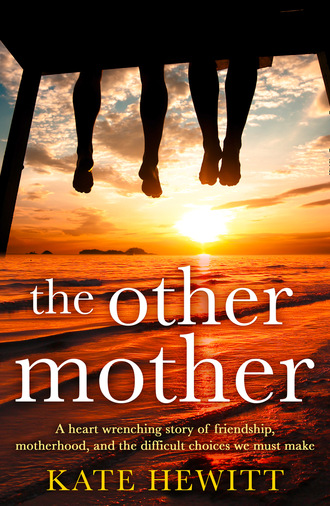
Полная версия
The Other Mother
I’m distracted as I greet them, giving Martha an air kiss because she doesn’t do hugs and making cheek-to-cheek contact with Rob because he’s a lot more in touch with his feelings, at least for a guy.
Martha is smiling, seeming relaxed as she tosses this fancy salad with home-made dressing. I don’t think she actually likes to cook, but she certainly likes to do things properly.
“How’s life in the ‘hood?” Rob asks as he hands me a beer without asking, and I take a sip before I think, Maybe I shouldn’’t.
What is going on with me?
“Fine,” I say. “You should come slumming downtown some time, Rob. Get a taste of the real New York.”
Rob pretends to shudder and Martha just smiles and shakes her head. It’s a long-running joke between us, how different our lives are. Martha and Rob have never even been to my apartment, and I think they’d be horrified if they went. It’s one step up from the ghetto in their world, but I don’t mind. I like my life. I do.
And it has no room for a baby in it.
I put my barely touched beer bottle down on the counter with a loud-sounding clink.
“Let’s eat,” Martha says cheerfully. “You haven’t gone vegan or anything, have you, Alex?”
“Actually, I’m on a fruitarian diet.”
“Fruit-what?” Rob says, and I roll my eyes.
“Joke. When have you ever known me to turn down a greasy burger?”
“I don’t think Martha’s ever made a greasy burger in her life,” Rob says as she brings the salad to the table in their little dining nook. He puts his arm around her and for a second she stills, as if she’s taking strength from that little caress. I see Rob’s face soften and I know he must feel protective of her since the last failed attempt at IVF. Watching them like this gives me a funny little ache, because I’m happy for them and yet somehow sad for myself.
They’re the ones who should be celebrating an unexpected pregnancy, a miracle. Not me.
I’m still thinking like that as we eat our salad, and I don’t pay too much attention to the conversation about a film festival Rob is judging, one of his hobbies.
“What’s up with you, Alex?” Martha asks as we finish the salad. She nods towards my plate, and I realize I’ve put all the bits of blue cheese to one side. I had the most ridiculous thought that blue cheese would be bad for the baby. I don’t know why I’m thinking this way, why part of me is acting like I’m actually going to keep it.
“Sorry,” I say. “Tired.”
“Hard week at work?” Martha asks with that teasing smile that lets me know she doesn’t really take my job seriously. She’s never said as much, but part-time barista work at thirty-five is pretty sad in her eyes. I know Martha feels I could have made more of myself; I went to a good college, I’m from an upper-middle-class home in Connecticut, I’m fairly smart. In Martha’s world I’m a failure.
“Yeah, work, I guess,” I say, trying to smile, because Martha has brought out the main course and it’s fish. It’s a fancy kind of fish, tilapia or something, in a lemon and herb sauce, but the smell of it is crazy intense. It smells like week-old mackerel to me and before I can help myself, before I can say anything more, I’m lurching upright and running to the bathroom off the front hall.
As I’m puking into the toilet I realize I haven’t even managed to close the door behind me, and Martha and Rob can hear everything.
I flush the toilet and rinse my mouth out, wash my face. After a few seconds I walk back into the dining room. Rob is looking bemused but Martha has gone very still, very alert. “Stomach bug?” Rob suggests, sympathetically, and I nod. Martha says nothing.
I don’t eat any of the fish. In fact, my little puking episode pretty much puts a damper on the whole evening, which is to be expected. I do manage a few forkfuls of rice, and I pass on the dessert and coffee.
“What about some ginger tea?” Martha suggests. “It’s supposed to settle the stomach.”
“I’m fine,” I say. “Really. It was just a one-time thing.”
And still Martha says nothing.
I have this horrible feeling she knows, and I feel worse for trying to hide it from her, although, really, I didn’t exactly have time to tell her. Still I feel a certain cool kind of assessment coming from her, and I don’t remember what we talk about for the rest of the evening. Not much, anyway.
I’m exhausted by the time I head home on the subway, and then take the 14th Street crosstown bus all the way over to Avenue C. I live on the top floor of an old tenement building, which is as bad as it sounds, although I’ve never minded before. At least I have my own place.
Yet now as I climb the stairs I’m thinking all kinds of ridiculous thoughts. Like how hard these stairs would be if I were nine months pregnant. And how there is no way I could haul a stroller up six narrow flights.
It’s past eleven by the time I finally get back to my apartment, and I see it all through this new lens of quasi-motherhood, these critical and despairing eyes I don’t like. It’s one little room, about fifteen feet by ten, with a tiny sink, a two-burner stove, and a mini fridge tucked in one corner. The bathroom holds a shower stall and toilet, no sink, and besides the futon, a table, and a bookcase I have no real furniture. I keep my clothes in a jumble of plastic crates stacked on top of one another.
I sink onto my futon, and I no longer have the strength not to think about it. Not to realize how ridiculous and impossible and stupid this all is, to contemplate for one second the possibility of actually having this baby. Of being a mother.
I don’t even want a baby, do I? I’m pretty sure I don’t. Yet this isn’t even about want; it’s about something deeper, something fundamental and biological. This might be my last chance. My last chance for a life I never even wanted before.
Three days go by and I still don’t call that number.
Chapter 3
MARTHA
Alex is pregnant. It beats like a bass drum through my mind, giving me a headache. Alex is pregnant. I count the symptoms silently, the throwing up being the most obvious one of all. She took one look at that fish and heaved. But there were others, I think as I lie in bed next to Rob that night. She looked pale, drawn. She put all the blue cheese in her salad to one side. She seemed a little dizzy when she stood up. She’’s pregnant.
I haven’t told Rob my suspicions, and I don’t intend to, not yet. He’d probably be happy for her, the way he’s happy for everybody, and her fertility would highlight my own failure as a wife, a woman.
I am furious that I can’t get pregnant after five years of trying and Alex can just fall into it. It’s probably a mistake. Alex isn’t seeing anyone as far as I know, and her life isn’t exactly set up for a baby. I can’t imagine her as a mother.
And then I realize that maybe, probably, she won’t have it. It’s early. She could still have an abortion. She probably will have an abortion.
And I feel a chill enter my soul, a terror I don’t understand. I know, on a purely analytical level, that what Alex does with her pregnancy has no bearing on my life. Yet I can’t escape this inexplicable fear that slips coldly through me, that somehow her ending this pregnancy will end something for me.
It’s absurd, because everything’s already ended for me.
I feel Rob’s hand rub my back, sleepy, half-hearted. “You okay?” he asks, and I wonder why he is asking. Am I tense? Can he feel it? He’s been so careful with me since the last IVF attempt, and I felt as if we were moving on. Just a little, but my soul was healing.
Now everything feels ripped open and raw.
“I’m fine,” I say, and Rob rolls over and falls fast asleep, slack-jawed and snoring. I lie there, staring up at the ceiling, everything in me tight and taut and angry. And all I can think is, Alex is pregnant. Pregnant. And I’’m not.
Alex and I have been friends, first by default and then by choice, for over twenty years. Our parents are neighbors in the same Connecticut suburb; they’ve been friends for even longer than we have. When we were growing up we were thrown together at all those awkward family functions, dinners and drinks parties and days at the beach. At first we circled each other warily, too different from one another to attempt to find any common ground. Alex is younger than me by a year, but in junior high she seemed cooler. She had the indifferent air of a rebel, even though I don’t think she actually did anything that rebellious. Still, I was the do-gooding people-pleaser: I got straight As; I had braces; I wore knee socks pulled up high until seventh grade. Alex seemed cool to me.
Looking back, I know Alex intimidated me; she was friendly but also indifferent, dreamily in her own world. I think even then I was both jealous of the kind of comfort she had with herself, and grateful for her overtures of friendship—playing video games in her family’s basement, wandering over to our neighborhood playground to hang out on the swings—even as part of me resented it, and the fact that I needed it, that I was the needy one.
Then my braces came off and I lost the knee socks, I grew three inches and two bra sizes and in tenth grade I was suddenly, superficially cool. It was a low-grade kind of thing; I was never in the actual popular crowd. But I had a boyfriend, I got into Yale, and my father bought me a navy-blue Mazda convertible for my seventeenth birthday. I was cool and Alex, who had never quite pulled together the rebel look, who had average grades and a random assortment of arty friends, no longer was.
And part of me was glad about that.
We were still friendly during all those tediousget-togethers, although I at least felt more smugly in control. I doubt Alex even noticed. At school, we stayed in our separate groups and never spoke, hardly even saw each other. We were in different years, after all.
Then my junior year in college I came home for summer break, intending to get some crappy job and make some money before going back to Yale. I hadn’t got the internship I wanted and I was feeling pretty low, and so I ended up fighting with my mother, which wasn’t, to be honest, all that uncommon an occurrence. Well, actually it was; since I was about sixteen I’d managed my mother as best I could, which mostly meant avoiding her, especially if she’d been drinking.
But that night we argued, I don’t even remember about what, and my mother locked me out of the house, and I ended up going across the street and knocking on Alex’s door.
I still remember how she opened the door: messy, rumpled, as if she’d just rolled out of bed although I don’t think she had. She didn’t look surprised to see me, even though we hadn’t spoken properly outside of family functions in years. She just smiled, said, “Martha, hey. Come on in,” and asked if I wanted a drink.
We drank beers out on her back patio; she was there alone, because her parents had gone on some golfing vacation for a couple of weeks. They travelled a lot, I remember, and Alex always seemed to have the house to herself.
I remember feeling a kind of vague, appalled pity for her, which I have probably felt on some level ever since. She hadn’t got into a good college; it was decent, some random place in Maine, but it wasn’t the kind that opened corporate doors. But then I couldn’t see Alex knocking on those doors, either. I remember watching her that night, in a sort of amazed fascination. She was drinking her beer almost absently, so unfazed by everything: her own wandering life, my sudden appearance, the limits of possibility on her own existence. She didn’t mind any of it, and, even though that horrified me, part of me was, I think, just a little bit jealous. To be so at ease, so relaxed and assured that life would unfold as it was meant to, like a map…! Yes, I was jealous.
At that point, of course, college was everything to me. I’d made Phi Beta Kappa my junior year and even though I hadn’t got the internship I’d wanted I was focused. I had a double major in English and Media Studies and I volunteered at an ad agency in New Haven during the school year. I had ambition, I had plans, I had everything, and Alex’s art major and aimless plans seemed awful to me.
And yet, despite our differences, we became friends. Real friends, not just ones forced together for yet another cocktail party or barbecue. I like being around Alex, mainly because she’s so different from me. She’s one of the few people who can actually make me belly laugh, although admittedly it’s rare. And she’s so relaxed about everything that when I’m with her I find myself unwinding just a little, just enough. Sometimes I wonder what she sees in me; maybe she needs one person in her life who gives her good advice, who tells her like it is. I like to think that she needs someone like me.
But now? If she’s pregnant? I feel as if it could change everything.
I wait three days and then I call her. I suggest we meet for coffee at a little place on Twenty-Third Street, halfway between my work place and where she is a barista. I take a cab and get there early; I order an iced latte and take the table in the corner.
She arrives twelve minutes late, which annoys me just a little because this is my lunch break, and I generally don’t take hour-long lunches. But that’s Alex, and I get that. Like I said, we’re different.
I smile, stand, place my cheek a half-inch from hers. We sit, and I ask if she wants a coffee. She shakes her head.
And then I say nothing, because for once I have no plan, no bullet points to cover. I want to ask if she’s pregnant, and yet I’m afraid to at the same time. Then Alex does something she hardly ever does; she takes the lead. She smiles and sighs and says,
“I know you know.”
And then suddenly it’s easy. “You’re pregnant.” She nods. I let out a shuddery breath, although I’m not sure what I’m feeling. Vindication? Jealousy? Relief? It’s all mixed up. “How far along are you?” I ask and she just shrugs.
“I’m sorry,” she says after a moment, and I stiffen.
“For what?”
“It just…it doesn’t seem fair, does it?” She looks at me with dark, sorrowful eyes and my throat starts to ache.
No, it damn well doesn’t seem fair, but weirdly I’m glad she’s acknowledged it. “What are you going to do?” I ask quietly.
“I don’t know.”
I feel a little better hearing that, although I’m not sure why. “What about the father?”
“I haven’t contacted him.”
“You’re not—dating?”
She lets out an abrupt laugh and shakes her head. “No.”
“Well.” I sit back. “I want to support you.” This sounds trite, and yet I mean it.
“I thought I was going to get rid of it,” she says in a low voice, not looking at me. “I mean, no-brainer, right? There’s no way I can have a baby.”
I don’t reply to that. “And then what happened?” I ask.
Another shrug. She still won’t look at me. “I don’t know. I keep meaning to call and then I just—don’t.” She glances up at me and I see a surprising welter of pain and confusion in her eyes; I’m so used to seeing Alex seeming laid-back to the point of indifference, the emotion surprises me. “I’ve had two abortions already,” she says and looks away again. I feel a cold ripple of surprise; I didn’t know that, and I’m surprised she didn’t tell me. We’ve been good friends, maybe even best friends, since college. Since that night I showed up on her doorstep and she let me in, no questions asked.
She sighs wearily. “I don’t know. I’m being stupid. I mean, there’s no way I could keep a baby. I don’t even have health insurance. And in any case…” She pauses, lowering her head so her hair falls in front of her face. “I can’t really see me as a mom, can you?”
No, I can’t, but this doesn’t seem like the time to say it, so I just murmur something unintelligible.
“I mean, I’d probably forget it somewhere, I’m that flaky,” she says with a little laugh that still sounds sad. “And you know, babies are so full on, aren’t they? They don’t just go away when you’re tired of them or whatever.” I say nothing and she laughs again and shakes her head. “Listen to me. Just the fact that I’m saying all this proves my point, right?”
I have a terrible feeling that she’s asking this question because she wants me to tell her that it doesn’t, that she’d be a good mom, she can do this. I don’t say any of it. The words bottle in my throat so I can barely swallow, because I know what I want now, and I want it so badly. “You don’t have to keep it,” I hear myself saying, and I sound weird, distant, as if someone else is talking and I am floating up above the table, watching this play out.
Alex stares at me, frowning, clearly waiting for more. And there is more. “You don’t have to keep it,” I say again, firmly now. “But you don’t have to get rid of it either. You could give it to me. Rob and I could adopt the baby, Alex.”
Chapter 4
ALEX
I hear what Martha says and I am both completely shocked and not surprised at all. I stare at her, my thoughts tumbling through my mind in an unholy kaleidoscope, so I can only snatch at fragments: if she adopts this baby, I’’ll see it all the time. We’’ll have to explain to our parents. I’’ll be pregnant and yet I won’’t have anything at the end. Martha will be so happy.
I shake my head. I’m not sure what I want to say or even think. “Martha—”
“Just think it over,” she says quickly. “I know it’s a lot to process, and of course there’s a lot we both need to think over. It’s a big deal.”
Hell, yes. It’s a very big deal. And still I just stare.
“Only if you want to,” she adds. “I mean, if you’re really sure you don’t want to keep it yourself. It’s an option, that’s all.”
An option that changes everything. How can I turn it—her—down? How can I get an abortion now, without seeming totally selfish? And if I did want to keep it, how could this not always be between us? The baby Martha could have had. The baby I shouldn’t have, that I feel as if I don’t deserve because I didn’t want it in the first place. Because I can’’t be a mom.
“Of course,” Martha continues, “Rob and I would make it worth your while.”
“You’d…pay me?”
“No, not pay,” Martha says. A faint blush touches her cheeks. “That’s illegal, in any case. I just mean we’d make sure you were taken care of, Alex. The medical bills and everything. I mean, even maternity clothes can be expensive. You know, the whole thing could kind of be fun. Almost…almost like we’re both pregnant, you know?” She smiles, and for a second I am reminded of years ago, our senior year of college, when we went to Fort Lauderdale together for spring break. We had an amazingly silly, fun time, just the two of us, kicking around on the beach and in bars, goofing off.
That vacation cemented our friendship so much that even when our lives veered in dramatically different directions, we still met up for coffee or dinner or a glass of wine. I was Martha’s maid of honor, even though she had three gorgeous, accomplished friends from Yale who could have easily stepped into those shoes. She told me she asked me because she was going to be tense enough dealing with her mother, and she needed someone to help her relax.
And even though I’ve rolled my eyes at her controlling and OCD tendencies, I’m glad to have someone like her in my life. I’ve needed someone like her in my life, because if I didn’t I’d just flake out completely. And I know, I absolutely know, she’d make a wonderful mom. A little strict maybe, and probably totally by the book, but still, a good mother.
But to my baby?
Martha is still staring at me, waiting for what? An answer, already? “Sorry,” I finally mutter. “I’m still processing all this.”
“Of course you are. I am too. I’m sorry to spring the idea on you like that. It just popped into my mind.” She bites her lip, and for a second she looks more uncertain, more vulnerable than I’ve ever seen her. “Maybe I shouldn’t have said anything.”
And I don’t answer, because I’m still reeling, and part of me is thinking, Yeah, maybe you shouldn’’t have.
Martha returns to work a little while later; I don’t remember what the rest of our conversation was like. She talked about some ad account for women’s running shoes she was working on and I just blanked out. I still feel blank as I take the 6 train down to Union Square and then walk across to the Sunflower Café on Third Avenue.
I’ve been working at the Sunflower for ten years; it’s a funky little place with a relaxed atmosphere and a laid-back owner, Julia, who actually cares about her employees, all three of us. It’s me, Jasmine, and Eduardo, and I get along with both of them.
As I walk in I see it’s me and Eduardo on duty today, and I put my bag in the back and slide on my apron without really meeting his eyes. I still feel weirdly blank, and I’m not sure I can manage a normal conversation.
Eduardo is cool about it though; he just moves over to give me room at the cash register while he’s on the espresso machine, since he’s better at it than I am.
“You okay?” he finally asks when there is a lull in business and the café’s four tables are empty. It’s a beautiful day in early August, warm but not too hot, sunlight gilding everything in gold. Everyone wants to be outside.
I nod, although I feel a little dizzy and definitely nauseous; I’m still reeling from Martha’s suggestion. “Yeah, I’m fine,” I say and Eduardo doesn’t reply, just raises his eyebrows. I know I’m not fooling him. And then, maybe because he’s a pretty nice guy or maybe just because I’m still so dazed from my conversation with Martha, I blurt, “I’m pregnant.”
Eduardo doesn’t say anything; he seems totally unruffled. And why shouldn’t he be? He’s not pregnant. He’s about ten years younger than me, gorgeous, Latino, a dancer. He’s in a modern dance troupe and I’ve seen some of his shows. I kept my eyes on him the whole time; he moved with a sensuous, sinuous grace I didn’t notice when he was working the espresso machine.
I let out a shuddery breath and stare at the cash register. “I don’t know what to do.”
“What are you thinking about doing?” Eduardo asks, and I can’t tell what he thinks about anything from his tone.
“Well,” I say slowly, “termination seems the obvious choice.”
“But?”
“But I don’t think I’m going to do that,” I say, and with a jolt I know I mean it. I really don’t want to go down that road this time, although my feelings about why not are too difficult to untangle right now. Maybe I want to try to be different, but I’m not sure how different I can be. “I can’t have a baby, though,” I say and Eduardo just waits. “I mean, my life is totally not—I live in a walk-up. On the sixth floor. I have no health insurance. I have no money.”
I shake my head at the sheer impossibility of it all and then Eduardo says softly, “But?”
“But?” I repeat blankly, even though I know what he means. Do I want this baby? I can’t think past the impracticalities, the impossibilities. It’s as if a brick wall has been built in my mind, and I can’t see past it. I certainly can’t go around it.
But I know I don’t want to get rid of this baby.
Do I want to give it to Martha?
I think of her and Rob at dinner the other night, the strength and sorrow I felt from both of them. I imagine how happy this baby could make them. I know they’d be good parents. Rob would make up for her OCD tendencies, her need to micromanage. They’d balance each other out in parenthood just as they do in marriage. They’d be perfect, a perfect team. At least they’d be a lot better than I would. I know this, and yet weirdly it hurts. In this moment I wish, bizarrely, that I were different. I almost wish I were more like Martha.
“You have time,” Eduardo says quietly. “Even if it feels like you don’t, you do. Don’t rush into anything.”
After work I head home, because I’m too tired even to think of doing anything else. I’m working at the community center tomorrow, teaching basic drawing to twenty-two nine-year-olds, and I need to go over my lesson plan. Not that my job is really about lesson plans; it’s more about just being there for the kids, offering them a different outlet. I love it, and for a second I think that if I can be a good teacher, maybe I could be a good mom.









